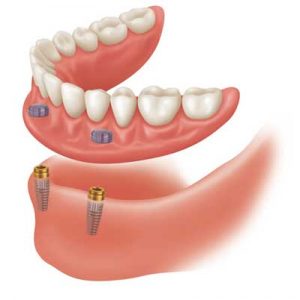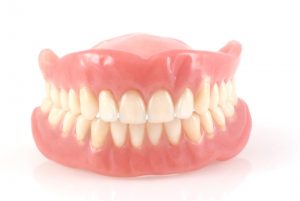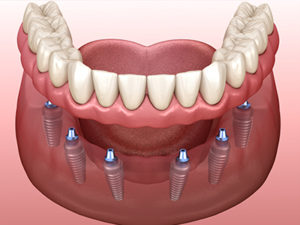 Choosing between dentures vs. implants significantly impacts oral health and overall well-being.
Choosing between dentures vs. implants significantly impacts oral health and overall well-being.
Teeth replacement is a crucial topic for anyone facing tooth loss. Many people will lose at least one tooth in their lifetime, making this issue highly relevant.
Both options, though differing in procedure, durability, comfort, and aesthetics, aim to replace missing teeth. The choice between dentures and implants depends on several factors, such as jawbone health, age, and personal preferences.
This article delves into the complexities of dentures vs. implants, allowing you to make an informed decision tailored to your unique needs.
Introduction to Tooth Replacement Options
Modern dentistry offers a range of tooth replacement options that have transformed the lives of patients with missing teeth. Whether you are missing a single tooth or several, today’s solutions can restore your smile and support your overall dental health. Dental implants are a popular choice, acting as artificial tooth roots that are surgically implanted into the jawbone by a skilled oral surgeon. These implants provide a strong foundation for replacement teeth that look and function like natural teeth.
Traditional dentures remain a widely used option, especially for those seeking a removable and non-surgical solution. These prosthetic devices are custom made to fit comfortably and replace missing teeth and surrounding tissue. For patients looking for added stability, implant supported dentures combine the benefits of both approaches. By anchoring dentures to dental implants, patients enjoy a secure fit that enhances chewing ability and confidence.
With the guidance of a dentist or oral surgeon, patients can explore these tooth replacement options to find the best fit for their dental health needs, lifestyle, and smile goals. Advances in dentistry ensure that everyone can find a solution to replace missing teeth and regain their quality of life.
Dentures: Established and Conventional Solutions
Dentures Overview:
- Affordability and Accessibility: Dentures tend to be more budget-friendly initially, providing an accessible option for tooth replacement for those on a limited budget.
- Non-Invasive Procedure: Acquiring dentures involves a non-invasive process, making it appealing for individuals who are uncomfortable with surgical procedures.
- Adaptable Solutions: Dentures cater to varying degrees of tooth loss, offering adaptability with partial dentures for a few missing teeth and full dentures for complete arches.
Challenges with Dentures:
- Stability and Comfort Issues: Dentures lack the stability of implants and may shift or slip, causing discomfort and potential embarrassment during eating and speaking. Removable dentures, in particular, can move around in the mouth, making them less secure than fixed options. Dentures generally have less recovery time compared to dental implants, as they are less invasive.
- Concerns about Bone Resorption: Dentures do not provide the same level of jawbone stimulation as implants, potentially leading to bone resorption and changes in facial structure over time. Fixed dentures attached to implants provide more stability. Fixed options are not removable by the patient, offering a secure fit. A fixed denture is a permanent solution for tooth loss. Fixed implant supported dentures are a stable alternative that are anchored directly to dental implants. Implants require enough bone in the jaw for successful placement, as the jaw is the site of both bone resorption and implant integration.
- Maintenance and Replacement: Regular removal for cleaning and possible use of adhesives are necessary for denture maintenance. Removable dentures can be taken out and reinserted by the patient for convenience, but may lack the stability of other options. They may also require relining or replacement due to wear and mouth changes every few years. For a more permanent solution, dental implants in Rockville offer an excellent alternative to traditional dentures, providing stability and a natural feel. An implant supported denture is a specific type that offers more stability than conventional dentures.
Implants: Robust Foundations for Dental Restoration
Implants Overview:
- Durability and Longevity: Dental Implants, constructed from biocompatible materials like titanium, boast exceptional durability. Their integration with the jawbone creates a stable foundation that can last a lifetime with proper care.
- Natural Appearance and Function: Full mouth dental implants closely mimic natural teeth in appearance and function. Customized crowns ensure aesthetic appeal and restored biting and chewing function.
- Jawbone Preservation: Dental implants help prevent bone loss by stimulating the jawbone, preserving its density and supporting your natural facial structure.
- Enhanced Confidence: This solution provides a higher level of confidence due to their secure anchoring, eliminating worries about slipping or clicking during activities.
Considerations with Implants:
- Surgical Procedure: Dental Implant placement involves minor surgery, potentially causing temporary discomfort or swelling for some individuals.
- Cost Factors: Implants tend to have higher initial costs compared to dentures, considering the surgical procedure, materials, and crown placement.
Cost Comparison
When considering tooth replacement, understanding the costs involved is essential for making an informed decision. Dental implants typically have a higher initial cost, with a single dental implant procedure ranging from $3,000 to $5,000. This investment reflects the surgical placement, high-quality materials, and the long-term durability of implants. Implant supported dentures, which use several implants to anchor a full denture, can be a cost-effective solution over time, as they often last many years with proper care and require fewer replacements.
Traditional dentures, including full dentures and partial dentures, are generally more affordable upfront, with costs for a complete set ranging from $1,000 to $3,000. However, these dentures may need to be replaced or relined every 5 to 7 years due to changes in the mouth and normal wear. When evaluating costs, it’s important to consider not only the initial procedure but also ongoing maintenance, potential repairs, and the expected lifespan of each option. By weighing these factors, patients can choose the tooth replacement solution that best fits their budget and long-term dental needs.
Maintenance and Care
Proper care is key to maximizing the life and effectiveness of any tooth replacement option. Dental implants are cared for much like natural teeth, requiring regular brushing, flossing, and routine dental checkups to maintain gum health and implant stability. This familiar oral hygiene routine helps ensure that implants remain strong and functional for many years.
Traditional dentures, on the other hand, need to be removed daily for thorough cleaning with special solutions to prevent staining and odor. Over time, dentures may need adjustments or replacement as the mouth changes shape. Implant supported dentures also benefit from regular cleanings and dental visits to monitor the health of the implants and surrounding tissues.
By following a consistent oral hygiene routine and scheduling regular professional cleanings, patients can help protect their investment—whether they have dental implants, implant supported dentures, or traditional dentures—and enjoy a healthy, confident smile for years to come.
The Role of Technology in Tooth Replacement
Technological advancements have revolutionized tooth replacement, making procedures more precise, comfortable, and effective for patients. Computer-aided design (CAD) and computer-aided manufacturing (CAM) allow dentists to create custom made dental implants and dentures that fit each patient’s unique mouth with exceptional accuracy. Digital impressions and 3D printing streamline the process, eliminating the need for messy traditional molds and ensuring a more comfortable experience.
Additionally, cone beam computed tomography (CBCT) scans provide detailed images of the jawbone and surrounding structures, enabling dentists to plan implant placement with confidence and precision. These innovations not only improve the fit and function of replacement teeth but also enhance the overall success and satisfaction of dental implant and denture procedures. Thanks to these technological breakthroughs, patients can expect better outcomes and a more natural-looking smile.
Patient Testimonials and Success Stories
Many patients who have chosen dental implants or implant supported dentures to replace missing teeth report life-changing results. They often describe a renewed sense of confidence, improved ability to eat their favorite foods, and a more natural smile. For many patients, dental implants have provided a stable, long-lasting solution that feels and functions like their own natural teeth, greatly enhancing their quality of life.
Others have found that implant supported dentures offer the security and comfort they were missing with traditional dentures, allowing them to speak and laugh without worry. These success stories highlight not only the functional benefits but also the positive impact on dental health and overall well-being. By sharing their experiences, patients help others understand the possibilities of modern tooth replacement and inspire them to take the next step toward a healthier, happier smile.
Making a Well-Informed Decision: Dentures vs Implants
Selecting between dentures vs. implants involves multiple factors, including budget, health status, preferences, and long-term goals.
Implants offer strength and lifelike quality, while dentures provide a cost-effective solution with adaptability, despite potential stability concerns.
Consulting a dentist is crucial to choose the best option for your circumstances. Factors like oral health, bone density, and overall health should guide your decision.
Ultimately, both dentures and implants have the potential to enhance your smile, restore confidence, and elevate your quality of life.


